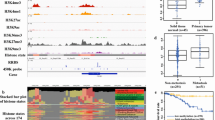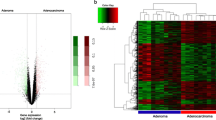Abstract
Background
Genomewide expression profiling has identified a number of genes differentially expressed in colorectal carcinomas (CRCs) compared to normal tissue. Some of these genes were linked to epithelial–mesenchymal transition. We tested whether genes including desmocollins and homeobox genes were distinct on the protein level and correlated the expression with clinicopathological data.
Methods
Tissue microarrays of 402 R0-resected colorectal carcinomas of UICC stage II or III were constructed to evaluate ten biomarkers. Furthermore, mRNA expression of desmocollins was evaluated in eight colon cancer cell lines. Demethylation test was performed by treatment with 5-aza-2´-deoxycytide in five colon cancer cell lines.
Results
On protein level, high expression of desmocollin 1 (DSC1) was observed in 41.6%, DSC2 in 58.0%, DSC3 in 61.4%, E-cadherin in 71.4%, CDX2 in 58.0%, PITX1 in 55.0%, CDK4 in 0.2%, TLE1 in 1.3%, Factor H in 42.5%, and MDM2 in 0.2%. Reduced expression of DSC1-3 was statistically linked to higher grading and DSC2, E-cadherin and CDX2 with shorter survival in high-grade carcinomas. Multivariate analysis showed that pathological stage and low PITX1 expression were statistically associated with shorter patients survival. On mRNA level, seven out of eight cell lines exhibited no expression of DSC1, and four out of seven restored DSC1 expression after demethylation test.
Conclusions
Reduced expression of PITX1 was independently correlated to shorter patients survival and could serve as a prognostic marker. Decreased expression of DSC1-3 is significantly correlated with higher tumor grading. Downregulation of DSC1 could be explained by DNA hypermethylation in colon cancer cells.




Similar content being viewed by others
References
Jemal A, Siegel R, Xu J, Ward E (2010) Cancer statistics, 2010. CA Cancer J Clin 60(5):277–300
Galanis E, Alberts SR, O'Connell MJ (2000) New adjuvant therapy for colon cancer: justified hope or commercial hype. Surg Oncol Clin N Am 9(4):813–823, discussion 825-816
Merkel S, Mansmann U, Papadopoulos T, Wittekind C, Hohenberger W, Hermanek P (2001) The prognostic inhomogeneity of colorectal carcinomas stage III: a proposal for subdivision of stage III. Cancer 92(11):2754–2759
Knösel T, Emde A, Schluns K, Chen Y, Jurchott K, Krause M, Dietel M, Petersen I (2005) Immunoprofiles of 11 biomarkers using tissue microarrays identify prognostic subgroups in colorectal cancer. Neoplasia 7(8):741–747
Knösel T, Emde V, Schluns K, Schlag PM, Dietel M, Petersen I (2006) Cytokeratin profiles identify diagnostic signatures in colorectal cancer using multiplex analysis of tissue microarrays. Cell Oncol 28(4):167–175
Simon R, Mirlacher M, Sauter G (2010) Immunohistochemical analysis of tissue microarrays. Methods Mol Biol 664:113–126
Chen Y, Knosel T, Ye F, Pacyna-Gengelbach M, Deutschmann N, Petersen I (2007) Decreased PITX1 homeobox gene expression in human lung cancer. Lung Cancer 55(3):287–294
Chen YN, Chen H, Xu Y, Zhang X, Luo Y (2008) Expression of pituitary homeobox 1 gene in human gastric carcinogenesis and its clinicopathological significance. World J Gastroenterol 14(2):292–297
Kolfschoten IG, van Leeuwen B, Berns K, Mullenders J, Beijersbergen RL, Bernards R, Voorhoeve PM, Agami R (2005) A genetic screen identifies pitx1 as a suppressor of ras activity and tumorigenicity. Cell 121(6):849–858
Watanabe T, Kobunai T, Yamamoto Y, Matsuda K, Ishihara S, Nozawa K, Iinuma H, Ikeuchi H, Eshima K (2011) Differential gene expression signatures between colorectal cancers with and without kras mutations: crosstalk between the kras pathway and other signalling pathways. Eur J Cancer.
Lord RV, Brabender J, Wickramasinghe K, DeMeester SR, Holscher A, Schneider PM, Danenberg PV, DeMeester TR (2005) Increased cdx2 and decreased pitx1 homeobox gene expression in Barrett's esophagus and Barrett's-associated adenocarcinoma. Surgery 138(5):924–931
Baba Y, Nosho K, Shima K, Freed E, Irahara N, Philips J, Meyerhardt JA, Hornick JL, Shivdasani RA, Fuchs CS, Ogino S (2009) Relationship of CDX2 loss with molecular features and prognosis in colorectal cancer. Clin Cancer Res 15(14):4665–4673
Funakoshi S, Ezaki T, Kong J, Guo RJ, Lynch JP (2008) Repression of the desmocollin 2 gene expression in human colon cancer cells is relieved by the homeodomain transcription factors CDX1 and CDX2. Mol Cancer Res 6(9):1478–1490
Khan K, Hardy R, Haq A, Ogunbiyi O, Morton D, Chidgey M (2006) Desmocollin switching in colorectal cancer. Br J Cancer 95(10):1367–1370
Yin T, Green KJ (2004) Regulation of desmosome assembly and adhesion. Semin Cell Dev Biol 15(6):665–677
Heuser A, Plovie ER, Ellinor PT, Grossmann KS, Shin JT, Wichter T, Basson CT, Lerman BB, Sasse-Klaassen S, Thierfelder L, MacRae CA, Gerull B (2006) Mutant desmocollin-2 causes arrhythmogenic right ventricular cardiomyopathy. Am J Hum Genet 79(6):1081–1088
Kottke MD, Delva E, Kowalczyk AP (2006) The desmosome: cell science lessons from human diseases. J Cell Sci 119(Pt 5):797–806
Bell A, Bell D, Weber RS, El-Naggar AK (2011) Cpg island methylation profiling in human salivary gland adenoid cystic carcinoma. Cancer.
Calvisi DF, Ladu S, Conner EA, Seo D, Hsieh JT, Factor VM, Thorgeirsson SS Inactivation of ras gtpase-activating proteins promotes unrestrained activity of wild-type ras in human liver cancer. J Hepatol 54 (2):311-319.
Cui T, Chen Y, Yang L, Knosel T, Zoller K, Huber O, Petersen I (2011) DSC3 expression is regulated by p53, and methylation of DSC3 DNA is a prognostic marker in human colorectal cancer. Br J Cancer 104(6):1013–1019
Acknowledgment
The work was supported by the Deutsche Krebshilfe (grant no. 108003).
Conflict of interest statement
We declare that we have no conflict of interest.
Author information
Authors and Affiliations
Corresponding author
Rights and permissions
About this article
Cite this article
Knösel, T., Chen, Y., Hotovy, S. et al. Loss of desmocollin 1-3 and homeobox genes PITX1 and CDX2 are associated with tumor progression and survival in colorectal carcinoma. Int J Colorectal Dis 27, 1391–1399 (2012). https://doi.org/10.1007/s00384-012-1460-4
Accepted:
Published:
Issue Date:
DOI: https://doi.org/10.1007/s00384-012-1460-4




